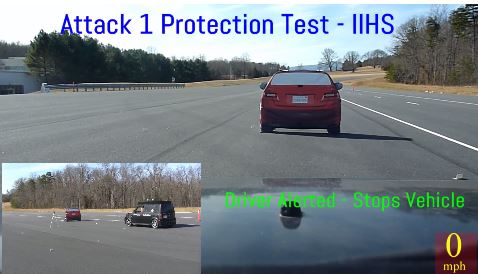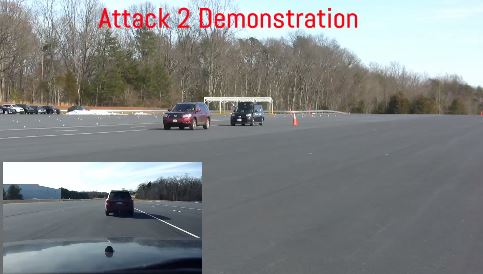 Mission Secure Inc.(MSi) and Perrone Robotics Inc.(PRI) announced that track testing proves that their solution can stop cyber attacks in cars. They also showed that cars can be remotely hacked through a key fob within 63 meters
Mission Secure Inc.(MSi) and Perrone Robotics Inc.(PRI) announced that track testing proves that their solution can stop cyber attacks in cars. They also showed that cars can be remotely hacked through a key fob within 63 meters
MSi’s Secure Sentinel solution successfully stopped critical car function hacks such as braking and accelerating. As cars increasingly rely on software and technology, they claim it opens up potential safety risks for cyber attacks.
The pilot project used methods developed by the University of Virginia with the Department of Defense for identifying cyber attacks on the car’s key functions. The team simulated realistic cyber attack scenarios against onboard control systems using the autonomous ground vehicle platform from PRI originally developed for the 2007 DARPA Urban Challenge (“Tommy Jr.”).
 Over the course of several months, the team remotely triggered several cyber attacks on the car taking over control of
Over the course of several months, the team remotely triggered several cyber attacks on the car taking over control of
- Braking.
- Acceleration.
- Collision avoidance, auto-braking powered by Lidar
- Adaptive cruise control.
The team monitored the response of the MSi Secure Sentinel Platform. PRI’s Tommy Jr. turned into a “hapless victim” during an attack on its controls. Upon hacking its speed control functions via a key fob attack within 63 meters away, Tommy Jr. was overtaken and sent to collide with a soft target.
 The MSi Secure Sentinel Platform was successful in thwarting attacks. It monitored key functions, including braking, acceleration and collision avoidance. When it detected a cyber attack was underway, it alerted the driver and allowed was able to put the car under driver control.
The MSi Secure Sentinel Platform was successful in thwarting attacks. It monitored key functions, including braking, acceleration and collision avoidance. When it detected a cyber attack was underway, it alerted the driver and allowed was able to put the car under driver control.
Without MSi Secure Sentinel, the attacks would have resulted in high-speed frontal and rear end collisions. These conditions could in real circumstance lead to injury or death.
The company notes that the testing reinforced that these types of cyber attacks can be initiated in any car.
 The pilot project was sponsored by the University of Virginia Department of Systems and Information Engineering. Successful road testing was completed on the Insurance Institute for Highway Safety (IIHS) Highway Loss Data Institute’s Vehicle Research Center test track this month.
The pilot project was sponsored by the University of Virginia Department of Systems and Information Engineering. Successful road testing was completed on the Insurance Institute for Highway Safety (IIHS) Highway Loss Data Institute’s Vehicle Research Center test track this month.
PRI’s MAX software platform technology has been automating vehicles since 2004, including passenger cars, ATVs, drop in actuator kits, and custom automated vehicle platforms. RRI is actively engaged in fielding robotic test platforms for use in vehicle safety testing by IIHS.
A more advanced project with more advanced types of attacks using the MSi Secure Sentinel Platform is underway.
Before you get worried about your car being hacked the testing occurred over several months with all companies sharing their information. The good news is that the companies are working with IIHS (Insurance Institute for Highway Safety) to ensure car safety. The Secure Sentinel solution is available to automakers for deployment.
Previously, on 60 Minutes a late-model Impala was shown to be remotely hacked by Darpa, usually remote attacks can only be carried out by professionals. The auto industry is working constantly to protect driver’s safety.
A former intern at Tesla, Eric Evenchick is selling device to help car hackers break into vehicle Connected Area Network (CAN buses).
A report written by the staff of Senator Edward J. Markey notes that new connected car technologies with wireless access could be open to hacking or unauthorized use of data for commercial purposes